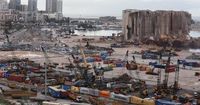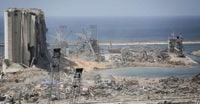Nearly five years after the catastrophic explosion that rocked Beirut’s port and left a scar on Lebanon’s capital, a dramatic turn has emerged: Bulgarian authorities have confirmed the arrest of Igor Grechushkin, the Russian-Cypriot shipowner linked to the shipment of ammonium nitrate that triggered the disaster. The arrest, which took place at Sofia International Airport on September 6, 2025, could represent a crucial step toward accountability in a case that has long been mired in political interference, legal delays, and international intrigue.
According to Bulgarian National Radio and multiple international outlets, Grechushkin, 48, was detained upon his arrival from Paphos, Cyprus. The head of border police at the airport, Zdravko Samuilov, stated that Grechushkin “did not resist arrest, cooperated, and nothing suspicious was found in his luggage.” The arrest was carried out on the basis of an Interpol red notice—an international request for arrest—issued at the request of Lebanese judicial authorities in 2020, soon after the explosion. Grechushkin, who holds both Russian and Cypriot citizenship, claimed to Bulgarian officials that he was merely visiting the country as a tourist.
The explosion on August 4, 2020, remains one of the most devastating non-nuclear blasts in modern history. At least 218 people were killed, more than 7,000 injured, and large swaths of Beirut were destroyed, causing billions of dollars in damage and plunging Lebanon deeper into an economic crisis that the World Bank has described as among the worst globally. The blast was traced to 2,750 tonnes of ammonium nitrate stored unsafely in a port warehouse—a shipment originally carried to Beirut by the Moldovan-flagged cargo ship MV Rhosus, purportedly owned or leased by Grechushkin.
The story of the MV Rhosus is itself a labyrinth of conflicting accounts and shadowy dealings. The vessel set out from Batumi, Georgia, in September 2013, reportedly bound for Mozambique with its hazardous cargo. However, the ship made an unscheduled stop in Beirut, allegedly to pick up additional cargo or due to mechanical problems. Once in Beirut, the ship was detained by port authorities for safety violations and unpaid debts. Its Russian and Ukrainian crew were left stranded, and Grechushkin, widely identified as the owner but sometimes described as merely the charterer, soon abandoned the vessel. The MV Rhosus eventually sank at its berth in 2018, but not before its deadly cargo was offloaded and stored in a port warehouse near Beirut’s grain silos.
Investigations by the Organized Crime and Corruption Reporting Project (OCCRP) and other outlets have raised questions about the true ownership of the ship and the intended destination of the ammonium nitrate. While Grechushkin is commonly named as the owner, OCCRP has suggested that another Cypriot shipping magnate may have been the ultimate beneficiary, with Grechushkin acting as a front or intermediary. The cargo’s supposed destination—Mozambique—has also been called into doubt, with some inquiries suggesting possible links to the Lebanese paramilitary group Hezbollah or other clandestine actors.
After years of warnings about the dangers posed by the stored ammonium nitrate, disaster struck on August 4, 2020, when a fire—likely sparked by welding work on the warehouse doors—ignited the chemicals. The resulting explosion leveled neighborhoods, shattered windows miles away, and left a city in mourning. Investigations later found that only about a fifth of the stored ammonium nitrate actually detonated, fueling suspicions that much of the cargo had been removed in secret, possibly for illicit purposes.
In the aftermath, Lebanese authorities issued two Interpol arrest warrants: one for Grechushkin and another for the ship’s captain, Boris Prokoshev, both Russian citizens. Yet, as of September 2025, no Lebanese official has been convicted in connection with the explosion. The investigation has been plagued by political interference and legal maneuvering. The first investigative judge, Fadi Sawan, was removed after attempting to hold former Prime Minister Hassan Diab and three ex-ministers accountable. His successor, Judge Tarek Bitar, faced similar resistance, with top politicians refusing to be interrogated and launching legal challenges to block his work. Despite resuming the probe earlier this year and questioning several officials, Bitar has yet to issue a long-awaited indictment.
The arrest of Grechushkin in Bulgaria has injected new momentum into the stalled investigation. According to Reuters, the Sofia City Court authorized his detention for up to 40 days, pending the arrival of an official extradition request from Lebanon. The Beirut Bar Association’s legal team is preparing the necessary dossier, which must include a detailed summary of the case, charges, and supporting evidence. "Once a wanted person enters a country that cooperates with Interpol, that state can arrest him, which is what happened in Bulgaria," explained lawyer Youssef Lahoud to The New Arab. He emphasized that the extradition process is not automatic: "The file must be precise and include clear evidence, so the Bulgarian authorities can either send him to Lebanon or return him to his home country."
However, the path to extradition is anything but straightforward. There is no formal extradition treaty between Lebanon and Bulgaria, meaning the decision ultimately rests with Bulgarian authorities. Grechushkin’s dual citizenship further complicates matters, as he could potentially be extradited to Russia or Cyprus instead. If sent to Russia, Moscow could decide whether to prosecute him domestically or release him, depending on the strength of Lebanon’s case.
If extradition fails, Lebanese investigators may travel to Bulgaria to question Grechushkin—though this, too, is complicated by a ban on Judge Bitar leaving the country, imposed by a previous prosecutor general. As Lahoud noted, "Unfortunately, there has been a delay and obstruction in addressing this case within Lebanon’s judiciary." Still, he believes Grechushkin’s arrest could be crucial: "If he provides new information, it could change the direction of the investigation and expand it. But he may also say nothing of value."
The renewed push for justice in Lebanon coincides with the election of President Joseph Aoun and Prime Minister Nawaf Salam, both of whom have pledged to support Judge Bitar and deliver accountability for the victims. Their backing has allowed Bitar to resume his work, and Grechushkin’s arrest is seen by many as a test of the new government’s resolve.
For the families of the victims, who have spent years demanding answers and accountability, the arrest offers a glimmer of hope—but also a reminder of the long road ahead. Political obstacles remain formidable, and the investigation’s outcome is far from certain. Yet, as the world watches Bulgaria weigh Lebanon’s extradition request, the possibility of a breakthrough in one of the decade’s most tragic and consequential disasters suddenly feels closer than ever.


